Racial Reconciliation

When I was a kid, my culturally Jewish parents distributed a mimeographed sheet in our Bronx, N.Y., neighborhood explaining why it was OK to be an atheist.
They would send me outside on Yom Kippur, the holiest day of the Jewish calendar, in torn jeans and a dirty shirt to play ball on our stoop while our neighbors dressed up and went to synagogue.
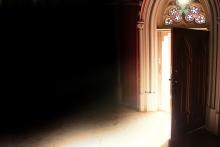
The nation’s second largest Presbyterian denomination has passed legislation repenting for “past failures to love brothers and sisters from minority cultures” and committing its members to work toward racial reconciliation.
The “overture” (or legislation) was approved overwhelmingly June 23 at the national meeting of the Presbyterian Church in America. The issue had been deferred from the previous year’s meeting, where there was a lengthy debate on similar legislation.
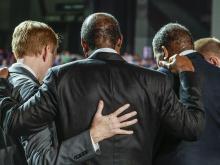
In recent years, Southern Baptists have made racial reconciliation a top priority.
This week, delegates (called “messengers”) to the SBC’s annual meeting in St. Louis overwhelmingly passed a resolution urging Christians to “discontinue the display of the Confederate battle flag.”
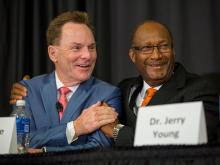
Southern Baptists turned a sharp focus on racism during their annual meeting, welcoming the president of a historically black denomination in a rare address to their national gathering.
“Those who would like to suggest that racism is not indeed a problem for the church but rather it is a sociological problem, I would argue it is without question a sin problem,” the Rev. Jerry Young, president of the National Baptist Convention, USA, told the predominantly white Southern Baptist Convention on June 14.

I was 6 years old, growing up in Cleveland. It was Christmas Eve. The traditional Slovak dinner was ready on the stove — mushroom soup and pierogies. My mom, my younger brother, and I were waiting for my dad to get home so we could eat.
The waiting part was no surprise.
My dad was an alcoholic. During the Korean War, he enlisted and was assigned to a paratrooper unit. He was wounded during a mission. My mom said the experience changed him. He brought some demons home with him.
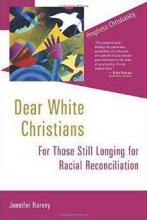
A white scholar touring churches across the nation is trying to convince Christians that racial reconciliation is not enough — it’s time to start talking about reparations for descendants of slaves.
And among mostly white, mainline Protestants this controversial — some would say unrealistic — notion is getting a hearing.
What divides the races in America, says Drake University ethicist Jennifer Harvey, is not the failure to embrace differences but the failure of white Americans to repent and repair the sins of the past.

We want to extend our sincere gratitude to all who signed the Open Letter to Franklin Graham in response to Graham’s original Facebook post on March 7. One month later, the open letter’s original team of writers, along with the Sojourners community, has been deeply encouraged by the broad support the letter has garnered. Thousands of faith leaders across the country have signed the letter with more joining in solidarity every day.
We thought you might be encouraged to see this updated list of principal signatories who have joined their voices to the thousands calling for repentance and reconciliation. Stay tuned for more ways to stay engaged in this conversation.
If you haven’t signed the letter yet, it’s not too late. Click here to sign the Open Letter to Franklin Graham.
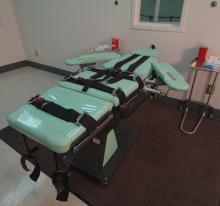
A new report by the Equal Justice Initiative documents in horrific detail the nation’s widespread practice of lynching and points to a link between lynching and a practice that persists today: capital punishment.
In the Jim Crow South, lynching declined as officials turned to executions as an alternative method for killing blacks in disproportionate numbers.
This report challenges us to confront our nation’s legacy of racial violence. Sadly, too many Christians were complicit in this violence, which has prompted Christian denominations to apologize and emphasize racial reconciliation. Last week, the Southern Baptist Convention held a two-day race summit in which it urged pastors to do more to diversify their churches.
These are important steps.
But they only mark time if important actions don’t follow.


It was 1987. I walked across Rutgers University campus with another freshman friend. We were on our way to a meeting for Campus Crusade for Christ (now Cru). In the gobs of our gab we happened upon the topic of the recent scandalous departure of Intervarsity Christian Fellowship president, Gordon McDonald. Interim President, Tom Dunkerton, guided the organization for the next year, appointing Dr. Samuel Barkat as first VP of Multiethnic Ministries. Soon after, Dr. Steve Hayner would accept the mantle of president of the troubled organization. Over the next 13 years, Hayner guided Intervarsity into a period of stability, growth, and racial healing.
Perhaps the most significant contribution of Hayner’s leadership was his close partnership with Dr. Barkat. Together they stood on the sovereign foundations of Intervarsity’s historic struggles toward racial righteousness and guided the organization through a deep examination of its multiethnic dynamics and its white dominant culture. Ultimately, their work led the parachurch collegiate ministry through a transformative examination of its own white western cultural lens and how that lens shaped their understanding of Jesus and the gospel.

How tough is it to create a racially diverse denomination? Consider a recent luncheon organized by the Southern Baptist Convention, the nation’s largest Protestant denomination.
About 100 Nashville-area evangelical leaders accepted invitations to a lunch hosted by the denomination’s policy arm, the Ethics & Religious Liberty Commission. On the agenda: a pitch for a spring summit and a short discussion by ERLC President Russell Moore about the need for churches to become more racially diverse.
The number of African-Americans who showed up for the lunch? Four (two of them denomination employees).
ERLC leaders originally planned a summit on bioethics. They quickly shifted gears after grand juries in November and December failed to indict police officers for the deaths of young unarmed black men. Moore’s social media remarks condemning the New York City jury’s decision not to indict the officer who killed Eric Garner were met with an angry backlash, some from people filling Southern Baptist pews and pulpits.
Black church leaders are greeting news of the summit with reactions ranging from polite skepticism to hopeful support.
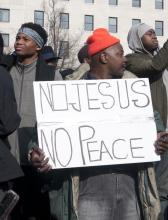
“Excuse my ignorance, I thought I was a free black man.”
“I’m 11 [years old], I matter.”
“You can choose to look away, but never again can you say you didn’t know.”
“How many times do we have to protest the same [s**t]?”
“White silence is white violence.”
“We have nothing to lose but our chains.”
These signs, and many others, lined the horizon of Pennsylvania Avenue on Saturday in Washington, D.C. In a ‘Justice for All’ march organized by Al Sharpton and the National Action Network, thousands of protesters gathered to protest police actions that have resulted in the deaths of unarmed young black men across the United States.
After marching from Freedom Plaza to the U.S. Capitol, protesters listened to speakers from national racial justice organizations address some of these most recent acts of police brutality.
Al Sharpton sought to draw attention to the diversity present on the streets.
“This is not a black march or a white march. This is an American march for American rights,” he said.
Indeed, the black community was not alone in speaking up against police brutality. One Latina activist encouraged her Latino brothers and sisters to “voice their pain” from police harassment and “come forth and unify with the African American community so we can be strong together.”
“¡Ya Basta!” she concluded. [“Enough is enough!”]

Could it be that the crescendo of dissention is divinely synched to yet again heighten disruptive unease among the status quo? Could it be that the promise of Emmanuel — "God is with us" — as proclaimed by the heavenly host, but feared by powerful elite, is unavoidably linked through the eternal truth — such that even the Church universal cannot celebrate one and avoid the other? Could it be that through Advent, we are called to acknowledge the humanity and parity of personhood, rather than rest in the laurels of privilege? The anger of youthful Ferguson protests was marginalized and dubbed as riots, but could it be that this Advent response manifested in expanded multiethnic solidarity is of divine intent to raise challenge to elitism and to demand respect for people of color as equals rather than as patronized subordinates? Could it be that whether or not the media chooses to ignore the connection, the Advent message for those with ears to hear is that perpetrators of brutality, the comfortable protectors of privilege, and the self-serving pundits of power that tried to nullify the everlasting promise were unsuccessful then and now? Could it be by divine design that unknown names, stolen lives, are now divinely lifted to eternal and global recognition as sacrificial symbols so that truth could come to light?

I currently serve as Pastoral Associate at a Catholic parish in Buffalo, NY, where our pastor decided to hold monthly Prayer Hours for Peace in response to the violent outbreaks in Syria, the uprising in Ferguson over Michael Brown’s death, ISIS, gang violence — to name a few.
Our November Prayer Hour for Peace offered four rounds of Scripture passages and ten-minute reflection and prayer time, followed with an excerpt from a Pax Christi USA prayer called “Just for Today.”
I read this excerpt aloud:
“Just for today, I will believe that world peace is possible. I will remember that hope is the most important gift I can give my world.”
The next Scripture verse was from Psalm 122:6-8.
“Pray for the peace of Jerusalem: May those who love you be secure. May there be peace within your walls and security within your citadels. For the sake of my family and friends, I will say, Peace be within you.”
For the next ten minutes, I inhaled “belief….possible” and exhaled “hope most important gift.” Physically, my body relaxed, and I watched my hope flow out into my immediate surroundings.
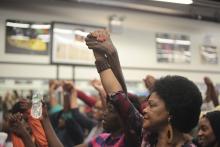
We must engage in courageous conversations. We need to have them in and amongst our own people—our families and our children, our close friends and allies, and in our racial/ethnic groups. A caucus can be an important thing. Make space for the asking of deep questions and the sharing of even awkward sentiments. Why is this happening? What does it mean? How does it affect my soul? Aren’t we past race yet, and can I do anything about this? How does my faith in God relate to these issues? How can I be a healer?
And we must have these conversations across what might seem to be natural divides. We need to have cross-racial/cross ethnic conversations. In order to do this, we must have relationships. We can’t liberate each other while we are in silos. Multiracial/multiethnic congregations like Middle Collegiate Church are critical to the work of racial reconciliation. If your church is diverse, think of ways to encourage deeper relationships. In our context, we have an ongoing small group called Erasing Racism, in which we are having critical conversations about race. If your context is mono-cultural, find a partner with whom to relate. Create a joint worship celebration or prayer vigil during Advent and have conversation as you break bread. Use questions like: When was the first time I was othered due to my personhood? When have I othered someone else? How can these experiences plant seeds for empathy? How did I learn the story of race and what can I do to change it?
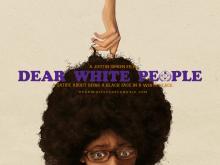
It might be tempting for some viewers to see Dear White People as over-the-top. To see some of its characters as caricatures, or the offensive party that makes up its climax — with white students dressed in blackface — as unrealistic. But it’s not. For evidence, you only need to look as far as the credits, which show photos from similar events at other schools across the country. And when the president of Winchester claims that “racism is over in America,” it doesn’t sound too different from Bill O’Reilly’s similar claim on The Daily Show just last week.
Dear White People is clever, loving, angry satire. It’s a multi-faceted exploration of race in a time when such portrayals are needed, like peroxide on a deep cut. The film sometimes falters in its process, but delivers the goods when it matters most. The fact that it comes so stingingly close to reality is stunning. It’s funny. It’s sad.
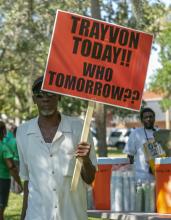
WE HAVE AMPLE reason to weep of late: war in Gaza, crisis in Syria, ISIS in Iraq, the slaying of five unarmed black men in one month at the hands of U.S. police officers, and the demise of congressional immigration reform.
Scripture calls us to cross over into the valley of lament at times such as these. Yet most of us are more comfortable on the plateau of rage or the plain of apathy.
I once led a training on lament and racial reconciliation. Twenty college students sat in the living room of a ministry house as I recited a lament from Jeremiah, the “weeping prophet”: “O that my head were a spring of water, and my eyes a fountain of tears, so that I might weep day and night for the slain of my poor people!” (9:1).
I spoke of the impact of racial injustice in our nation and on our campuses. I recounted slave narratives to the students—stories that had brought me to tears privately. Yet, when the last word was read, the students sat silent with glazed eyes staring back at me.
I didn’t get it. The whippings of human beings, the children separated from their mothers and fathers, the hands, feet, and lives lost in the midst of America’s darkest hours—these things happened. How could we not lament?

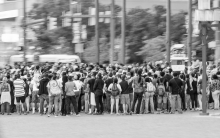
Editor's Note: In light of this week’s events in Ferguson, Missouri, several writers at ON Scripture took a few moments to reflect upon what they would/will be preaching on this Sunday. To continue the conversation, join on Twitter at #onscripture.
Eric D. Barreto, Associate Professor of New Testament, Luther Seminary: St Paul, MN
The last thing a preacher wants to do on a Saturday night is to log into Facebook.
I exaggerate, of course, but I found myself scrambling last week when I learned of Michael Brown’s shooting last Saturday. My sermon for Sunday morning was ready to go. But I had to reassess all my work when I heard the witness of so many African American friends in particular as the news from Ferguson began spreading across social media. The frustration and disbelief, rage and disappointment, resignation and passion I heard moved me. But even more convicting was the fact that so many others were simply unaware of this event at the moment and unfazed by its repercussions.
In certain communities, no one had to pay attention to Michael Brown. In certain communities, his death did not resonate with significance. In certain communities, no one would confront the preacher and ask why she did not respond to the death of this young person.
And yet in other communities, his death was a touchstone, a cause for prayer and lament and righteous anger and faithful expectation.
These distinct reactions are a raw reminder that our communities of faith remain largely segregated. Though we worship the same God, the contexts within which we seek God’s face are radically different. In such a divided context, what does it look like to love your neighbor? What does it look like to be “one” church even as we are profoundly divided?